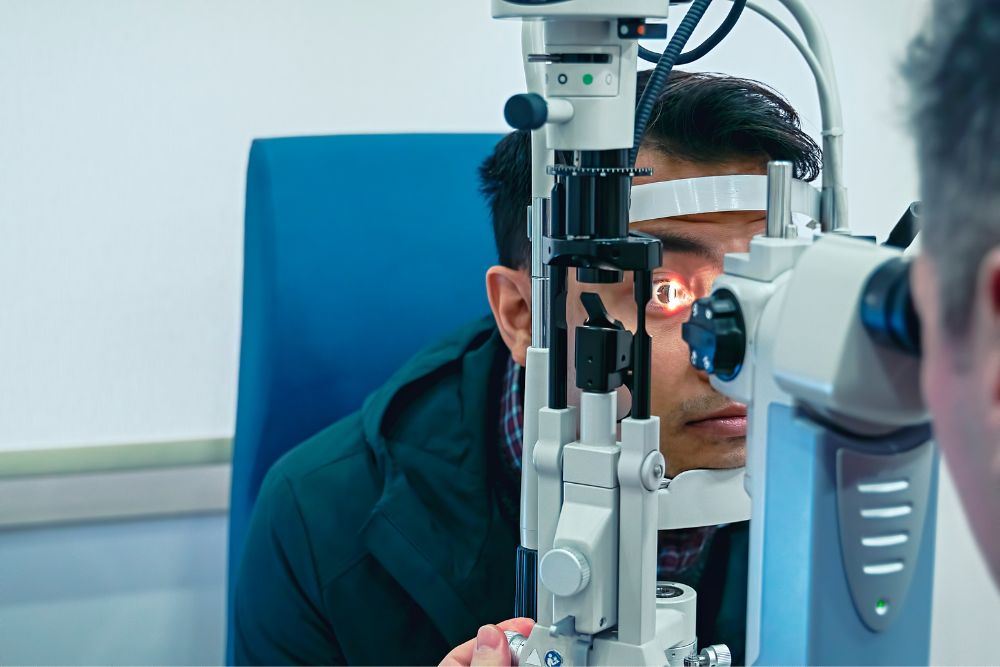All You Need to Know About Retinal Diagnostic Testing

The retina may just be a thin tissue layer, but by enabling vision, it is among your eye’s most valuable components. Due to its size, location, and importance, any retinal damage or condition can be serious. At Retina Group of Florida, we employ a full suite of cutting-edge diagnostic methods to precisely detect retinal conditions earlier. Our retinal specialists can then decide on your best course of treatment.
The Importance of Dilated Eye Exams For Retinal Diagnosis
Whether you are healthy or have a specific vitreoretinal condition, everyone should schedule a regular dilated ophthalmological examination. Depending on certain factors, you may need a dilated eye exam every 1-2 years if you:
- Are over age 60
- Are African American and over age 40
- Have a family history of glaucoma
- Have diabetes or high blood pressure
Consistent exams provide a detailed overview of your general eye and vision health. They also enable existing or potential issues to be identified and diagnosed. Your initial visit may be a little longer, as it will include retinal testing, a full examination, and a discussion of your condition with you and your family, if necessary.
We’ll apply special eye drops to dilate both of your eyes, providing an unobstructed view of the retina and the back of the eye. Typically, you’ll remain dilated for up to 4 hours or more. Occasionally, dilation may last more than 24 hours in children’s eyes, as stronger and longer-lasting drops are needed. Afterward, your pupils will be open and taking in more light, so you’ll be sensitive to bright light.
Retinal Diagnostic Testing Services
During your exam, we may perform certain medical and diagnostic tests. These tests, which identify the presence, severity, and location of vitreoretinal concerns and abnormalities, include:
Amsler Grid Test
This black-and-white paper grid, used at home every day, allows you and your doctor to monitor your vision for any problems. You simply look to see if there are any broken, curved, or distorted lines, which may indicate macular degeneration. If so, you should contact your ophthalmologist immediately, as macular degeneration is best diagnosed and treated early, helping to preserve your long-term retinal health.
Optical Coherence Tomography (OCT)
This non-invasive imaging test helps to identify any retinal issues with clarity and accuracy. Infrared light waves capture detailed, high-resolution, cross-sectional images of the structures within your retina. OCT can be used to check on blood vessel health or determine if fluid has leaked into the retinal tissue. It only takes a few minutes, and your eyes are untouched.
Fluorescein Angiography
This diagnostic technique takes photographs of your retinal blood supply. A yellow dye is injected into your arm, which then travels to your eye’s blood vessels. Retinal specialists then take images to identify and observe retinal abnormalities. In particular, fluorescein angiography is used to diagnose and manage conditions affecting the retinal blood vessels, such as macular degeneration, diabetic retinopathy, and retinal occlusions.
Indocyanine Green Angiography
Indocyanine green angiography also involves a dye being also injected into your arm and circulated through your bloodstream to photograph internal retinal structures. But this dye is green, and when exposed to infrared light, it lights up, providing a better view of the retina’s deeper blood vessels, which are difficult to identify otherwise.
Schedule Retinal Diagnostic Testing in Florida
Any retinal damage or conditions put your vision at risk, making quick, precise diagnosis crucial. If you suspect a retinal issue or you have questions, please contact Retina Group of Florida for an appointment.

